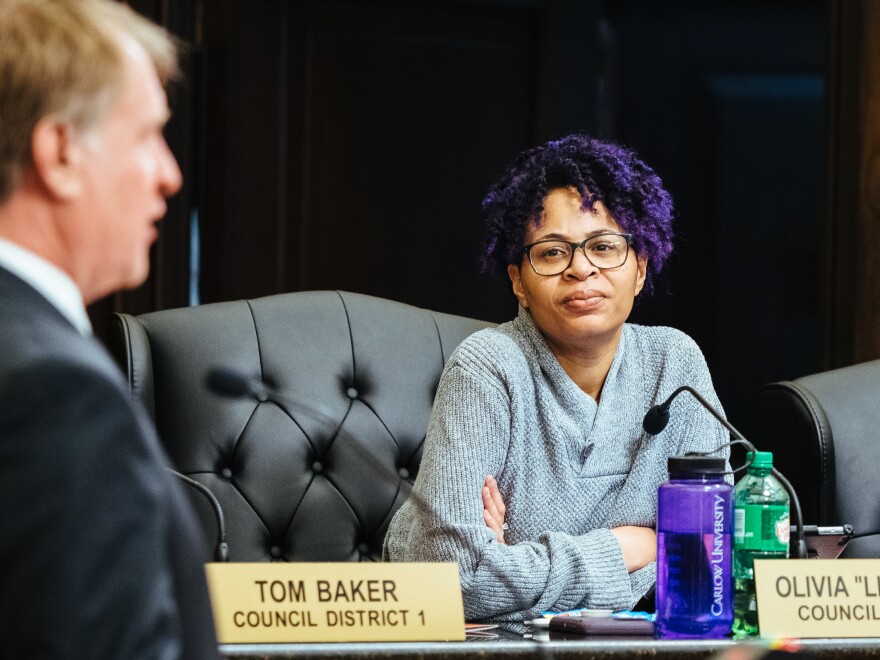Two Allegheny County councilors have proposed legislation that will establish a mask mandate for public gatherings — and will test the body’s power to pass health regulations even as an earlier months-long dispute over those powers concludes.
Bethany Hallam and Liv Bennett have proposed a bill that would require people to wear masks — either indoors or outdoors — in any gathering of more than 250 people or else pay a $100 fine. The bill, an effort to limit the spread of the coronavirus, would expire at the end of April unless extended, and contains an exception for residences.
“We’re losing lives right now, and we have a responsibility to do something about it,” said Bennett. She noted that the county reported roughly 350 new COVID-19 cases a day over the weekend. “Our numbers are atrocious,” she said. “Every day I see them, it worries me. Folks are trying to act like we’re not in a pandemic, but for me, this screams for urgency and immediacy.”
But it is decidedly unclear whether council actually has the power to pass such a mandate.
Generally, health rules and regulations must be advanced by the county’s Board of Health, not council. In fact, council is set to vote Tuesday night on a sick-leave bill that was delayed for months after County Executive Rich Fitzgerald vetoed a bill council passed in the spring, saying the measure had to be crafted by county health authorities.
“Knowing the trajectory that paid sick leave took, we were trying to avoid that” with the mandate, Bennett said. “That was part of the reason it took so long to come up with this legislation: We were trying to do the gymnastics of trying to make sure it stays with us. It took months to get paid sick leave approved, and we don’t have six months. We need this now.”
The legislation seeks to bypass county health authorities by crafting the mandate as only a temporary expedient and not a lasting rule — and therefore doesn’t need to go through the usual rule-making process — and by asserting that the health department lacks the bandwidth to devise a mandate on its own.
The mandate legislation includes the assertion that “the temporary nature of the masking controversy renders the creation of a rule and/or regulation … both unnecessary and inappropriate." In any case, it adds, passing such a standard “would be impossible for the Allegheny County Health Department … given current Department staffing levels, budgeting, and the Department’s other regulatory responsibilities.”
A spokeswoman for Fitzgerald declined to comment, which is consistent with a policy of not responding to legislation at this stage. But at least one expert in municipal law was unimpressed by the workaround.
"I think it's a specious argument,” said Duquesne University law professor Joe Mistick. “Most of their proposed legislation talks about why it’s a good idea to do this, but that doesn’t mean they have the power to do it.”
The state’s Local Health Administration law grants county health authorities jurisdiction over “the formulation of rules and regulations for the prevention of disease, for the prevention and removal of conditions which constitute a menace to health, and for the promotion and preservation of the public health generally.”
Mistick said that doesn’t leave council much leeway.
“You have to have the power delegated to you by the state, and if it’s in the health department’s jurisdiction, even if they allegedly don’t have the capacity to do it is no legal grounds for someone else to do it. I thought [Fitzgerald] was right about the sick leave bill, and I don’t see any reason for why this is any different.”
But as with the sick-leave bill, even a failed measure could prompt action by the administration.
“Part of the goal is to try to start the conversation and really highlight the need for this,” said Bennett. “I think one of the biggest frustrations is the executive branch, and the director of the health department could just put out a mask mandate without having to go through these obstacles.”
There will be little discussion of the measure Tuesday night beyond its referral to a committee. The sick-leave bill went to a health committee chaired by Cindy Kirk, who delayed action on an early version of the bill for months. But Bennett said the mask mandate could be directed to a public safety or other committee instead.
But in any case, Bennett said, “I don’t care what way it happens: If Jesus has to come down from the throne, I just really feel like this needs to happen.”





